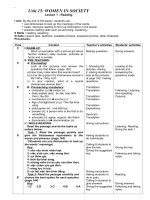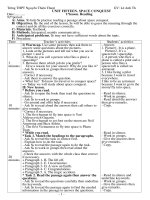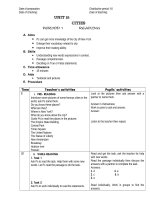UNIT 15 PRACTICE 1
Bạn đang xem bản rút gọn của tài liệu. Xem và tải ngay bản đầy đủ của tài liệu tại đây (118.83 KB, 8 trang )
<span class='text_page_counter'>(1)</span>ENGLISH 12 UNIT 15: WOMEN IN SOCIETY PRACTICE 1 Mark the letter A, B, C or D on your answer sheet to indicate the word whose underlined part is pronounced differently from that of the rest in each of the following questions. 1. A. legal B. women C. deny D. depend 2. A. social B. socialism C. society D. socialize 3. A. fight B. enough C. right D. light Mark the letter A, B, C or D on your answer sheet to indicate the word which is stressed differently from the rest. 4. A. status B. argue C. basis D. against 5. A. position B. agency C. century D. politics Mark the letter A, B, C or D on your answer sheet to indicate the correct answer to each of the following sentences. 6. Thanks to the women’s liberation, women can take part in ………..activities. A. social B. society C. socially D. socialize 7. A child receives his early ………….. from their parents. A. educate B. education C. educator D. educative 8. To preserve that …………, it was necessary to preserve the people that had created it. A. civil B. civilize C. civility D. civilization 9. In former days, women were considered not to be suitable for becoming a …………. . A. politics B. political C. politically D. politician 10. Most people consider it women's ……….. to take care of children and do housework. A. limit B. relationship C. responsibility D. respect 11. In some most Asian countries women never have the same ……… as men. A. formality B. basis C. status D. limit 12. It’s against the law to ………. on the basis of sex, age, marital status, or race. A. suit B. discriminate C. believe D. gain 13. Girls must all be sent to school because ……….. will provide better opportunities. A. education B. beliefs C. rights D. politics 14. Women are increasingly involved ……….. the public life. A. of B. in C. with D. from 15. What does "www" …………. for? Is it short for “world wide web?” A. sit B. stand C. lie D. point 16. Alice opened the door and found that it …………. to a small passage. A. led B. showed C. cut D. pointed 17. Mrs. Jones's husband …………. last Friday. We are all shocked by the news. A. passed away B. kept away C. held up D. got over 18. If you do not understand the word "superstitious”, …………. in the dictionary. A. look it over B. look it up C. look it out D. look it on 19. Don't forget to …………. your gloves on. It is cold outside. A. let B. make C. put D. fix 20. If you don't pay your rent, your landlord is going to ………….! A. kick you off B. kick you down C. kick you out D. kick you away 21. I'm sorry. I didn't mean to interrupt you. Please …………. and finish what you were saying. A. go on B. go off C. go up D. go down.
<span class='text_page_counter'>(2)</span> 22. I didn't get to see the end of that mystery movie on TV last night. How did it …………. out? A. go B. make C. bring D. turn 23. When you are finished using the computer, can you please …………. it off. A. take B. turn C. do D. go 24. Either John or his friends …………….wrong. A. are B. have C. is D. has 25. No longer …………….busy with their housework due to modern labor-saving devices. A. women are B. women do C. do women D. are women 26. They could ……………. find the way to arrive home. A. hard B. harder C. hardly D. hardlier 27. Were you ……………. with the last exam results? A. interested B. keen C. satisfied D. boring 28. Linda: “In my opinion, women are usually more sympathetic than men.” David: “……………………. .” A. Yes. What nonsense! B. I couldn’t agree more C. What are you saying? D. I couldn’t agree less. 29. Sunny: “Do you think you will pass the exam?” Michael: “……………………. .” A. I know so B. Well, I hope so C. I think not D. Yes, that’s right 30. Mr. Henry: “Do you think that we should use public transportation?” Dr. Kavin: “……………………. .” A. Well, that’s very surprising. B. Of course not. I bet! C. Yes. it’s an old idea. D. There’s no doubt about it. Mark the letter A, B, C or D on your answer sheet to indicate the underlined part that needs correction. 31. However small, the siting room is well designed and nicely decorated. A B C D 32. We admire Lucy for her intelligence, cheerful disposition and she is honest. A B C D 33. You can enjoy a sport without taking part a club or belonging to a team A B C D 34. Jack London is known as one of the great novelist of the world. A B C D 35. Susan stopped to write her letter because she had to leave for the hospital A B C D Mark the letter A, B, C or D on your answer sheet to indicate the correct answer to complete each of the following sentences. 36. ……………, women do less housework than they used to twenty years ago. A. The more labor-saving devices there are B. Labor-saving devices force C. Thanks to labor-saving devices D. If there were labor-saving devices 37. Women spend nearly 3 hours a day on average on housework ………….. . A. as much as shopping and childcare B. together with they go shopping and childcare C. excluding shopping and childcare D. and they do shopping and childcare.
<span class='text_page_counter'>(3)</span> Mark the letter A, B, C or D on your answer sheet to indicate the sentence that has the same meaning as the original one. 38. We will set off tomorrow. A. We will arrive home tomorrow. B. Tomorrow will be a good day for us to go C. We will leave the place tomorrow. D. We will have to postpone our trip tomorrow 39. Despite her age, she gets about easily. A. She is too old to do anything easily. B. Because she is old, she cannot go anywhere. C. Although she is old, she can travel easily. D. Her age prevents her from going from place to place. 40. I am very interested in the book you lent me last week. A. The book is interesting enough for you to lend me last week. B. It was the interesting book which you lent me last week. C. The book which you lent me last week is too interesting to read. D. The book that you lent me last week interests me a lot. Read the following passage and mark the letter A, B, C or D on your answer sheet to indicate the correct word(s) for each of the blanks from 41 to 45. Women’s Rights, rights that establish the same social, economic, and political (41) ……… for women and men. Women’s rights guarantee that women will not face discrimination on the basis of their sex. Until the second half of the 20 th century, women in most societies were denied some of the legal and political rights accorded to men. (42) ……… women in much of the world have gained significant legal rights, many people believe that women still do not have complete political, economic, and social equality with men. Throughout much of the history of Western civilization, (43) …… cultural beliefs allowed women only limited roles in society. Many people believed that women’s natural roles were as mothers and wives. These people considered women to be better suited (44) …… childbearing and homemaking rather than for involvement in the public life of business or politics. Widespread belief that women were intellectually inferior to men led to most societies to limit women’s education to learning domestic skills. Well-educated, upper-class men controlled most positions of (45) …… and power on society. 41. A. position B. place C. status D. seat 42. A. Because B. Therefore C. Unless D. Although 43. A. deep-seated B. deep-rooted C. deep-based D. in-depth 44. A. for B. to C. as D. with 45. A. employer B. employee C. employment D. employs Read the following passage and mark the letter A, B, C or D on your answer sheet to indicate the best answer to the questions from 46 to 50. Until the 19th century, the denial of equal rights to women met with only occasional protest and drew little attention from most people. Because most women lacked the educational and economic resources that would enable them to challenge the prevailing social order, women generally accepted their inferior status as their only option. At this time, women shared these disadvantages with the majority of working class men, as many social, economic, and political rights were restricted to the wealthy elite. In the 19 th century, as governments in Europe and North America began to draft new laws guaranteeing equally among men, significant numbers of women – and some men – began to demand that women be accorded equal rights as well. At the same time, the Industrial Revolution in Europe and North America further divided the roles of men and women. Before the Industrial Revolution most people worked in farming or crafts-making, both of which took place in or near the home. Men and women usually divided the.
<span class='text_page_counter'>(4)</span> numerous tasks among themselves and their children. Industrialization led male workers to seek employment outside of the home in factories and other large-scale enterprises. The growing split between home and work reinforced the idea that women’s “rightful place” was in the home while men belonged in the public world of employment and politics. Organized efforts by women to achieve greater rights occurred in two major waves. The first wave began around the mid-19th century, when women in the United States and elsewhere campaigned to gain suffrage – that is, the right to vote. This wave lasted the 1920s, when several countries granted women suffrage. 46. Why did the denial of equal rights to women draw little attention from the society until 19th century? A. They could challenge the prevailing social order. B. They had some options. C. They did not have the disadvantages with most working men. D. A majority of women lacked the educational and economic resources. 47. Until the 19th century, the status of the working class men in the society was that …. A. They had the same rights as women. B. They had no right at all. C. They did not have much power compared to the wealthy people. D. They had much power in the society. 48. Women’s movement started in Western countries ………………….. A. In the 18th century B. In the late 18th century C. In the 19th century D. In the 20th century 49. What did the effect of the Industrial Revolution in Europe and North America bring about? A. Male workers tried to seek employment outside of the home. B. It brought the equality to women. C. Working class men controlled most positions of employment and power in society. D. Women could work outside the home. 50. The aim of the women’s movement in the United States in the 1920s was …………. A. To gain the right to have much power in the society. B. To gain the right to vote. C. To gain the right to go to work in the factory. D. To have the complete equality to men.. UNIT 15: WOMEN IN SOCIETY PRACTICE 1 Mark the letter A, B, C or D on your answer sheet to indicate the word whose underlined part is pronounced differently from that of the rest in each of the following questions. 1. A. legal B. women C. deny D. depend 2. A. social B. socialism C. society D. socialize 3. A. fight B. enough C. right D. light Mark the letter A, B, C or D on your answer sheet to indicate the word which is stressed differently from the rest. 4. A. status B. argue C. basis D. against 5. A. position B. agency C. century D. politics.
<span class='text_page_counter'>(5)</span> Mark the letter A, B, C or D on your answer sheet to indicate the correct answer to each of the following sentences. 6. Thanks to the women’s liberation, women can take part in ………..activities. A. social B. society C. socially D. socialize 7. A child receives his early ………….. from their parents. A. educate B. education C. educator D. educative 8. To preserve that …………, it was necessary to preserve the people that had created it. A. civil B. civilize C. civility D. civilization 9. In former days, women were considered not to be suitable for becoming a …………. . A. politics B. political C. politically D. politician 10. Most people consider it women's ……….. to take care of children and do housework. A. limit B. relationship C. responsibility D. respect 11. In some most Asian countries women never have the same ……… as men. A. formality B. basis C. status D. limit 12. It’s against the law to ………. on the basis of sex, age, marital status, or race. A. suit B. discriminate C. believe D. gain 13. Girls must all be sent to school because ……….. will provide better opportunities. A. education B. beliefs C. rights D. politics 14. Women are increasingly involved ……….. the public life. A. of B. in C. with D. from 15. What does "www" …………. for? Is it short for “world wide web?” A. sit B. stand C. lie D. point 16. Alice opened the door and found that it …………. to a small passage. A. led B. showed C. cut D. pointed 17. Mrs. Jones's husband …………. last Friday. We are all shocked by the news. A. passed away B. kept away C. held up D. got over 18. If you do not understand the word "superstitious”, …………. in the dictionary. A. look it over B. look it up C. look it out D. look it on 19. Don't forget to …………. your gloves on. It is cold outside. A. let B. make C. put D. fix 20. If you don't pay your rent, your landlord is going to ………….! A. kick you off B. kick you down C. kick you out D. kick you away 21. I'm sorry. I didn't mean to interrupt you. Please …………. and finish what you were saying. A. go on B. go off C. go up D. go down 22. I didn't get to see the end of that mystery movie on TV last night. How did it …………. out? A. go B. make C. bring D. turn 23. When you are finished using the computer, can you please …………. it off. A. take B. turn C. do D. go 24. Either John or his friends …………….wrong. A. are B. have C. is D. has 25. No longer …………….busy with their housework due to modern labor-saving devices. A. women are B. women do C. do women D. are women 26. They could ……………. find the way to arrive home. A. hard B. harder C. hardly D. hardlier 27. Were you ……………. with the last exam results? A. interested B. keen C. satisfied D. boring 28. Linda: “In my opinion, women are usually more sympathetic than men.” David: “……………………. .”.
<span class='text_page_counter'>(6)</span> A. Yes. What nonsense! B. I couldn’t agree more C. What are you saying? D. I couldn’t agree less. 29. Sunny: “Do you think you will pass the exam?” Michael: “……………………. .” A. I know so B. Well, I hope so C. I think not D. Yes, that’s right 30. Mr. Henry: “Do you think that we should use public transportation?” Dr. Kavin: “……………………. .” A. Well, that’s very surprising. B. Of course not. I bet! C. Yes. it’s an old idea. D. There’s no doubt about it. Mark the letter A, B, C or D on your answer sheet to indicate the underlined part that needs correction. 31. However small, the siting room is well designed and nicely decorated. A B C D 32. We admire Lucy for her intelligence, cheerful disposition and she is honest. A B C D 33. You can enjoy a sport without taking part a club or belonging to a team A B C D 34. Jack London is known as one of the great novelist of the world. A B C D 35. Susan stopped to write her letter because she had to leave for the hospital A B C D Mark the letter A, B, C or D on your answer sheet to indicate the correct answer to complete each of the following sentences. 36. ……………, women do less housework than they used to twenty years ago. A. The more labor-saving devices there are B. Labor-saving devices force C. Thanks to labor-saving devices D. If there were labor-saving devices 37. Women spend nearly 3 hours a day on average on housework ………….. . A. as much as shopping and childcare B. together with they go shopping and childcare C. excluding shopping and childcare D. and they do shopping and childcare Mark the letter A, B, C or D on your answer sheet to indicate the sentence that has the same meaning as the original one. 38. We will set off tomorrow. A. We will arrive home tomorrow. B. Tomorrow will be a good day for us to go C. We will leave the place tomorrow. D. We will have to postpone our trip tomorrow 39. Despite her age, she gets about easily. A. She is too old to do anything easily. B. Because she is old, she cannot go anywhere. C. Although she is old, she can travel easily. D. Her age prevents her from going from place to place. 40. I am very interested in the book you lent me last week. A. The book is interesting enough for you to lend me last week. B. It was the interesting book which you lent me last week. C. The book which you lent me last week is too interesting to read. D. The book that you lent me last week interests me a lot..
<span class='text_page_counter'>(7)</span> Read the following passage and mark the letter A, B, C or D on your answer sheet to indicate the correct word(s) for each of the blanks from 41 to 45. Women’s Rights, rights that establish the same social, economic, and political (41) ……… for women and men. Women’s rights guarantee that women will not face discrimination on the basis of their sex. Until the second half of the 20 th century, women in most societies were denied some of the legal and political rights accorded to men. (42) ……… women in much of the world have gained significant legal rights, many people believe that women still do not have complete political, economic, and social equality with men. Throughout much of the history of Western civilization, (43) …… cultural beliefs allowed women only limited roles in society. Many people believed that women’s natural roles were as mothers and wives. These people considered women to be better suited (44) …… childbearing and homemaking rather than for involvement in the public life of business or politics. Widespread belief that women were intellectually inferior to men led to most societies to limit women’s education to learning domestic skills. Well-educated, upper-class men controlled most positions of (45) …… and power on society. 41. A. position B. place C. status D. seat 42. A. Because B. Therefore C. Unless D. Although 43. A. deep-seated B. deep-rooted C. deep-based D. in-depth 44. A. for B. to C. as D. with 45. A. employer B. employee C. employment D. employs Read the following passage and mark the letter A, B, C or D on your answer sheet to indicate the best answer to the questions from 46 to 50. Until the 19th century, the denial of equal rights to women met with only occasional protest and drew little attention from most people. Because most women lacked the educational and economic resources that would enable them to challenge the prevailing social order, women generally accepted their inferior status as their only option. At this time, women shared these disadvantages with the majority of working class men, as many social, economic, and political rights were restricted to the wealthy elite. In the 19 th century, as governments in Europe and North America began to draft new laws guaranteeing equally among men, significant numbers of women – and some men – began to demand that women be accorded equal rights as well. At the same time, the Industrial Revolution in Europe and North America further divided the roles of men and women. Before the Industrial Revolution most people worked in farming or crafts-making, both of which took place in or near the home. Men and women usually divided the numerous tasks among themselves and their children. Industrialization led male workers to seek employment outside of the home in factories and other large-scale enterprises. The growing split between home and work reinforced the idea that women’s “rightful place” was in the home while men belonged in the public world of employment and politics. Organized efforts by women to achieve greater rights occurred in two major waves. The first wave began around the mid-19th century, when women in the United States and elsewhere campaigned to gain suffrage – that is, the right to vote. This wave lasted the 1920s, when several countries granted women suffrage. 46. Why did the denial of equal rights to women draw little attention from the society until 19th century? A. They could challenge the prevailing social order. B. They had some options. C. They did not have the disadvantages with most working men. D. A majority of women lacked the educational and economic resources. 47. Until the 19th century, the status of the working class men in the society was that …..
<span class='text_page_counter'>(8)</span> A. They had the same rights as women. B. They had no right at all. C. They did not have much power compared to the wealthy people. D. They had much power in the society. 48. Women’s movement started in Western countries ………………….. A. In the 18th century B. In the late 18th century C. In the 19th century D. In the 20th century 49. What did the effect of the Industrial Revolution in Europe and North America bring about? A. Male workers tried to seek employment outside of the home. B. It brought the equality to women. C. Working class men controlled most positions of employment and power in society. D. Women could work outside the home. 50. The aim of the women’s movement in the United States in the 1920s was …………. A. To gain the right to have much power in the society. B. To gain the right to vote. C. To gain the right to go to work in the factory. D. To have the complete equality to men..
<span class='text_page_counter'>(9)</span>









